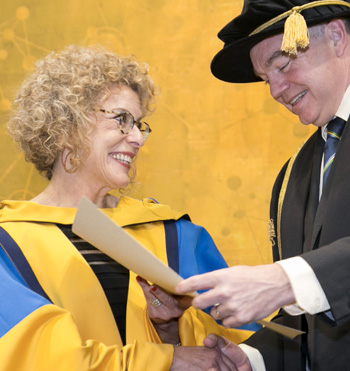Shana Poplack
UNIVERSITY COLLEGE DUBLIN
HONORARY CONFERRING
4 December 2017 at 2 pm
TEXT OF THE INTRODUCTORY ADDRESS DELIVERED BY PROFESSOR VERA REGAN, UCD School of Languages, Cultures and Linguistics on 4 December 2017, on the occasion of the conferring of the Degree of Doctor of Literature, honoris causa on SHANA POPLACK
_____________________________________________________________________
President, Distinguished guests, Ladies and Gentlemen,
 Professor Shana Poplack is one of the most respected and influential linguists in the world today. Hers is a truly extraordinary career; she has fundamentally altered linguistic theory and influenced attitudes to language and language policy. It is a great pleasure to honour her today with a Doctorate from University College Dublin. We welcome also to Dublin, and to UCD, her son, Simon.
Professor Shana Poplack is one of the most respected and influential linguists in the world today. Hers is a truly extraordinary career; she has fundamentally altered linguistic theory and influenced attitudes to language and language policy. It is a great pleasure to honour her today with a Doctorate from University College Dublin. We welcome also to Dublin, and to UCD, her son, Simon.
Shana Poplack investigates social and linguistic issues relating to bilingualism and minority varieties by going straight to the source: the everyday speech of ordinary people. In Ireland, we are especially well placed to appreciate the significance of this work, because language has always played a crucial role in Irish history, and Irish people know the importance of language. Even though we are speakers of English, we are conscious of our other language, Irish, and of our condition as bilinguals. We know about language choice, the symbolism of language, code switching (switching from one language to another) and language loss. We know what it feels like to speak what some people consider a non-prestige version of a major world language (we speak Irish English, not ‘standard’ English!). We know about prescriptive and elitist attitudes towards such language varieties. These are among the issues Shana Poplack has brilliantly researched, and brought to the general public.
In addition to challenging linguistic theories and transforming research methods in sociolinguistics, her work scientifically legitimises the language of ordinary people. With her unique data banks of natural speech, she uses cutting edge analytical tools and methods to trace the evolution of speech varieties. She has discovered the startling structured regularity and historical pedigree of many stigmatized speech forms, debunking widespread linguistic stereotypes and reversing language discrimination.
Shana Poplack is Distinguished University Professor, and holds the prestigious Canada Research Chair in Linguistics at the University of Ottawa. She did her B.A. in Romance Languages at Queens College, City University of New York. Her M.A. in Linguistics and French Literature was at New York University. She spent seven years in Paris, where she studied with the world famous linguist, André Martinet. She did her PhD at the University of Pennsylvania under the supervision of William Labov, founder of the field of Variationist Sociolinguistics.
Later, at the University of Ottawa, she set up her renowned Sociolinguistics Laboratory, the leading research centre in the field in Canada, and arguably, the world. Her students have authored more than 200 conference presentations and over 100 publications. She has supervised a large number of Ph.D. dissertations, M.A. theses, and a host of post-doctoral fellows from all around the world.
A major theme of Poplack’s research is the analysis of linguistic variability and its relationship to language change, especially in bilingual and minority language contexts. She showed that French Canadians were not speaking ‘bad French’, as was generally believed, but a French which had evolved naturally on Canadian soil. Poplack also showed that alternating languages while speaking (as when French Canadians use English words and phrases when they are speaking French) is a skilful and creative use of language, and not the reflection of a deficiency. Her discoveries about language mixing were ground breaking, and all major modern theories of bilingual behaviour now define themselves in relation to them. Her seminal and engagingly entitled (1980) paper “Sometimes I’ll start a sentence in English y termino en Espagnol : towards a typology of code switching” was recently recognized as the single most cited paper in the 50-year history of the journal Linguistics. Her studies of French-English code-switching and borrowing led to a series of projects on more than a dozen bilingual immigrant communities in Canada, including, among others, Tamil-English and Finnish-English bilinguals, and Wolof-French and Fongbe-French bilinguals. Another of Shana’s research stream, this time on the genesis of African American English, provided unprecedented evidence that this not an inferior form of English; rather it is an archaic dialect which resisted change through the geographic and social isolation of its speakers.
Shana’s work is also known through her talks which are always enthusiastically received. She has delivered no less than 95 keynote and plenary addresses, not to mention 215 other papers.
Her ground breaking and hugely influential contributions have been recognised by international awards too numerous to name. She was elected to the Royal Society of Canada, obtained the first Canada Research Chair in Linguistics, was made Fellow of the Linguistic Society of America, and was recently named member of the Order of Canada. She received the Pierre Chauveau Medal, a Trudeau Fellowship Award, the Killam Prize, the Ontario Premier’s Discovery Award, the National Achievement Award of the Canadian Linguistic Association and the Canadian Social Science and Humanities Research Council Gold Medal for Achievement in Research.
We are proud to honour her achievements today.
Praehonorabilis Praeses, totaque Universitas,
Praesento vobis hanc meam filiam, quam scio tam moribus quam doctrina habilem et idoneam esse quae admittatur, honoris causa, ad Gradum Doctoratus in Litteris; idque tibi fide mea testor ac spondeo, totique Academiae.